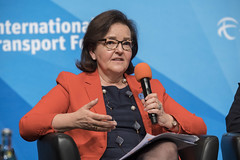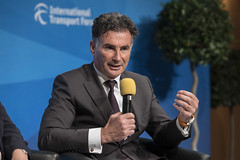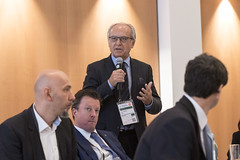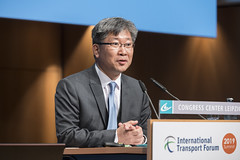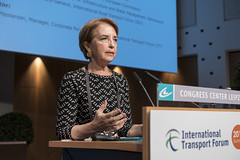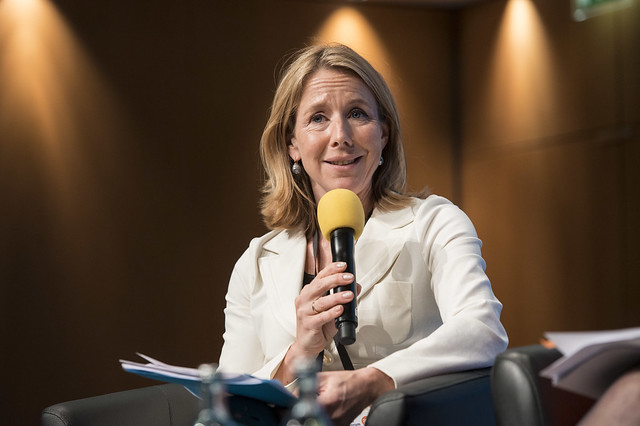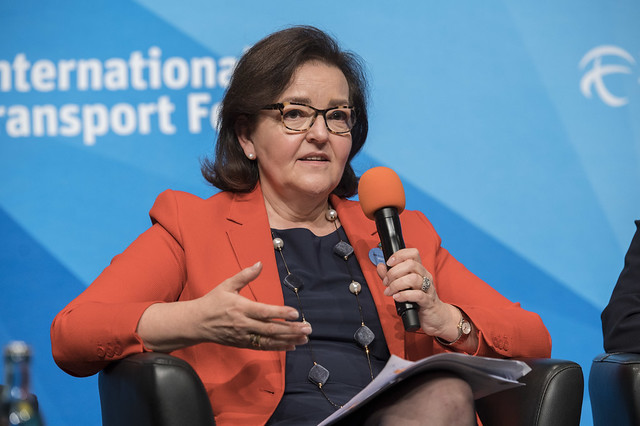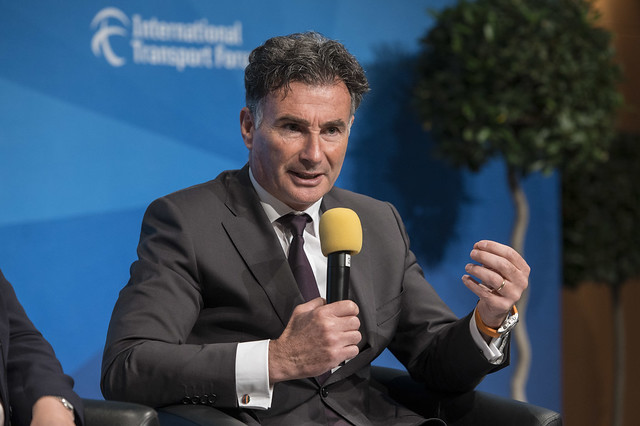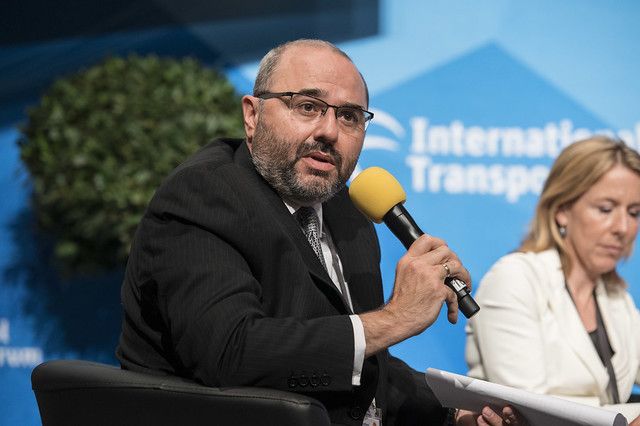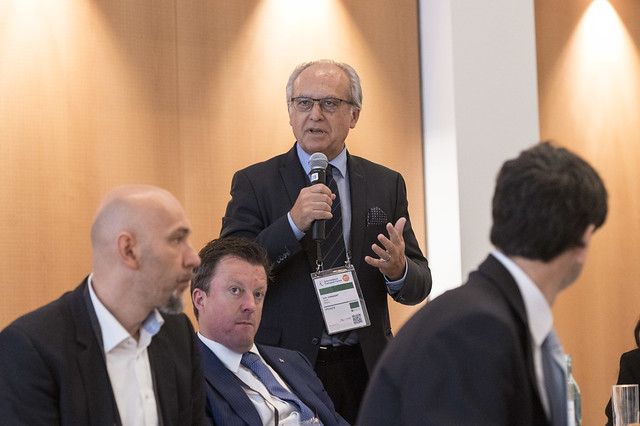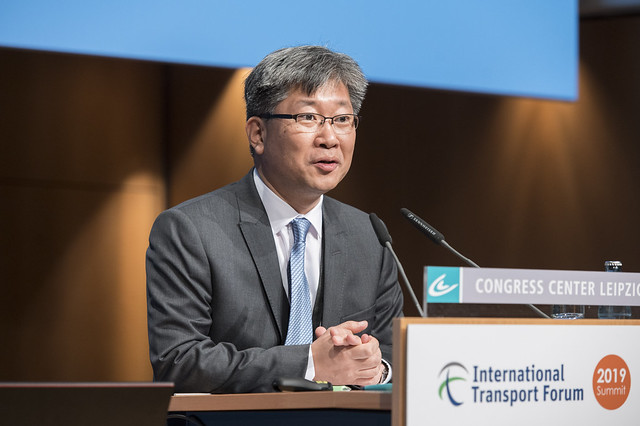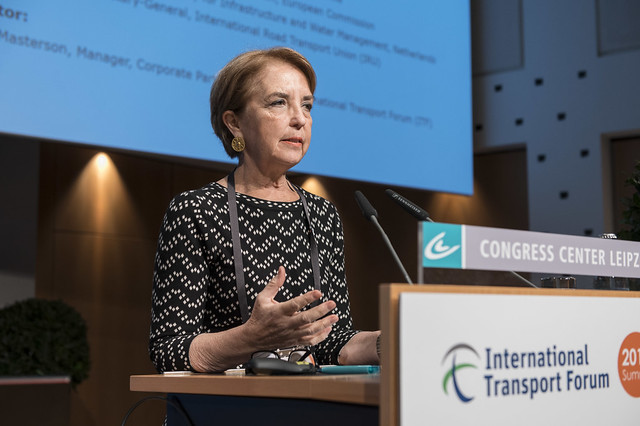The ITF’s Decarbonising Transport (DT) initiative is a global, data-driven, multi-stakeholder initiative with over 70 key stakeholders. It aims to support the transition to carbon neutral transport. It is the ITF’s major contribution to improving understanding of how to ensure a low-carbon future for transport. The initiative aims to build capacity to help close the gaps between climate commitments and the carbon dioxide (CO2) reductions that mitigation actions will deliver by providing the best possible assessment of the impact of a range of potential mitigation actions.
Jari Kauppila, ITF’s head of Quantitative Policy Analysis and Foresight, opened the session by presenting the DT initiative, its most recent outputs and recently launched projects. He also provided an outlook on transport CO2 emissions to 2050. This included a “High ambition scenario” developed as part of the ITF’s Transport Outlook 2019, which goes beyond currently agreed policies for reducing transport CO2 emissions. This might achieve transport CO2 reductions of 30% by 2050, compared to a 2015 base year. Such reductions are, however, insufficient for achieving climate goals.
James Grabert, Director at the Sustainable Development Mechanisms Programme, United Nations Climate Change Secretariat (UNFCCC), then emphasized the importance of scaling up current ambitions in upcoming NDC (nationally determined contributions) revision cycles. This will only be achieved if cross-sectoral issues are tackled, and all relevant stakeholders, across sectors and industries, are involved. Clara de la Torre, Director of the Directorate General of Research and Innovation at the European Commission seconded James Graber’s view, noting that alliances not only have to be built across countries, but also with industry and society. The European Commission is engaged in several initiatives here, and supports the ITF’s Decarbonising Transport initiative to build stakeholder platforms.
Stientje van Veldhoven, State Secretary for Infrastructure and Water Management, The Netherlands, said that the focus of the discussion must move from the question “if” we decarbonize, to the question “how” we do it. The Netherlands has set out concrete reduction targets, which are the first step toward getting stakeholders involved and discussing with them how they can actually be achieved. Not every sector and/or every business can contribute to the same extent; however, stakeholders typically are encouraged when good practice examples from other businesses or countries are identified. In many instances, there is still ‘low hanging fruit’ – i.e. readily implementable options that can be pursued to achieve transport CO2 reductions. Importantly, such solutions often entail co-benefits, such as reductions in air pollution and improved fuel economy.
Umberto de Pretto, Secretary General of the International Road Transport Union (IRU), said that road transport needs to be seen as part of the solution to the transport CO2 reduction ambitions. A key perspective is that energy savings in road transport translate directly to cost reductions for vehicle operators. As such, IRU found that it was not difficult to convince their membership to agree to CO2 reduction targets. However, further actions are required. The best solution will depend on both the specific transport operation and the specific geographic context. One option that is readily able to be implemented is the widespread adoption of high capacity vehicles. However, their use is still greatly restricted by regulators. Measures that ensure smooth traffic flow are also highly relevant, as heavy goods vehicles consume disproportionately more fuel when operating in stop-and-go traffic.
In the following Q&A session, several common themes emerged: future freight transport demand will only be met when all resources are used at full capacity, at very high efficiency levels. Inter-modality will be a key to operating efficiently, and digitalization and cross-border standardization (beyond EU borders) will be the main enabler for inter-modal operations. Hence, regulators and policy makers should ensure that digitalization and standardisation are driven forward.
ITF Secretary-General Young Tae Kim then invited Ms. Gloria Hutt Hesse, Minister of Transport and Telecommunications, Chile, to make closing remarks. Ms. Hutt highlighted that Chile will bring together transport ministers at the COP25 meeting in Santiago in December this year, acknowledging that transport is an important contributor to CO2 emissions and that transport ministers will need to work together on the issue. She also highlighted specific challenges for less developed countries, where governments need to have an increased focus on climate change adaptation measures to protect the poor, who are generally the most exposed to climate change effects. Ms. Hutt also reiterated the need to cooperate across sectors, borders and industries, and the importance of digitalization for the design of efficient transport operations. She underlined the fact that travelers will have to get used to using transport more efficiently. Vehicles, space and resources will have to be shared – in the freight and passenger transport sectors – to meet future transport demand.
Speakers
Speakers

James Grabert
Director, Sustainable Development Mechanisms Programme
United Nations Climate Change Secretariat (UNFCCC)






